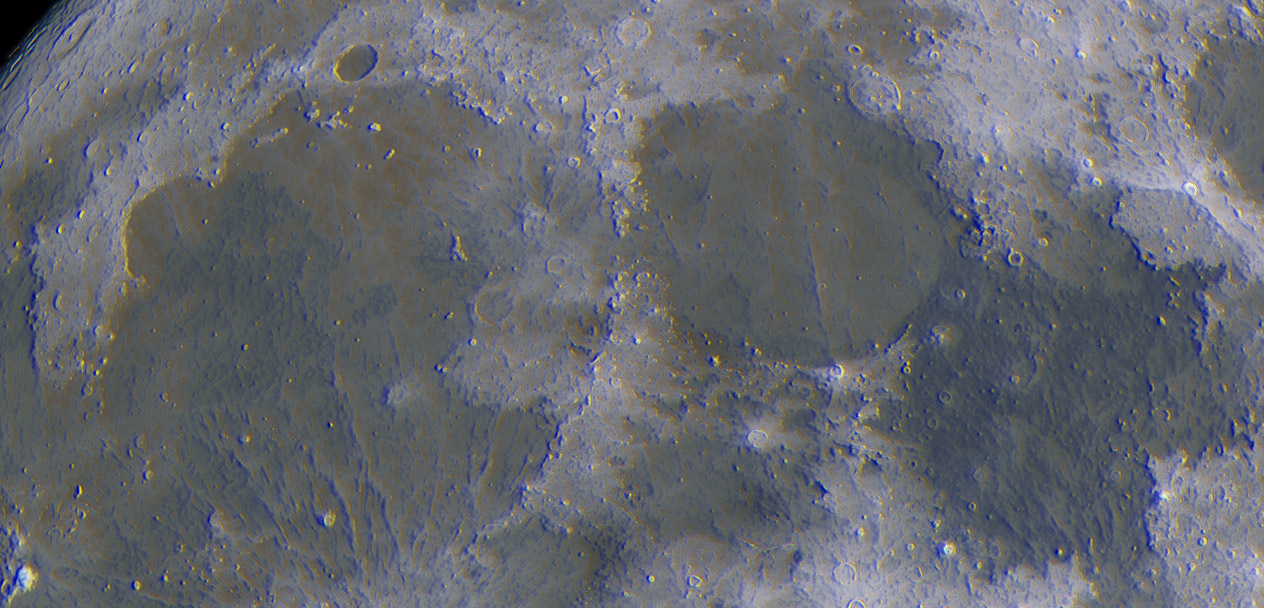Difference between revisions of "April 24, 2011"
| Line 6: | Line 6: | ||
<em>image by [mailto:schramm.thilo@web.de Thilo Schramm], Kiel, Germany</em><br /> | <em>image by [mailto:schramm.thilo@web.de Thilo Schramm], Kiel, Germany</em><br /> | ||
<br /> | <br /> | ||
| − | Here is an image that is very different than any we have seen. It is a full Moon view but | + | Here is an image that is very different than any we have seen. It is a full Moon view but |
| − | haves a strong 3-D effect. All Thilo did was "shift the blue channel some pixels." So this | + | haves a strong 3-D effect. All Thilo did was "shift the blue channel some pixels." So this |
| − | image is not revealing topography, but still reveals interesting features. Two things are | + | image is not revealing topography, but still reveals interesting features. Two things are |
| − | most notable. First, rays show up like mare ridges because the displaced blue pixels look | + | most notable. First, rays show up like mare ridges because the displaced blue pixels look |
| − | like shadows of the brighter red and green ones. Thus, the rays from Copernicus appear | + | like shadows of the brighter red and green ones. Thus, the rays from Copernicus appear |
| − | as radiating ridges. Older and fainter ridges must have less blue for they simply look like | + | as radiating ridges. Older and fainter ridges must have less blue for they simply look like |
| − | faint rays - see north-eastern Imbrium. The second notable feature is the ruggedness of | + | faint rays - see north-eastern Imbrium. The second notable feature is the ruggedness of |
| − | some maria, especially Tranquillitatis. The offset of the blue pixels would have maximum | + | some maria, especially Tranquillitatis. The offset of the blue pixels would have maximum |
| − | 3-D effect for lunar materials that reflect more strongly in the blue - that would be titanium. | + | 3-D effect for lunar materials that reflect more strongly in the blue - that would be titanium. |
| − | Comparison with a compositional [http://www.lpod.org/archive/fr/ILUJ-2005-02-07.htm map] shows a nearly perfect match of titanium and | + | Comparison with a compositional [http://www.lpod.org/archive/fr/ILUJ-2005-02-07.htm map] shows a nearly perfect match of titanium and |
| − | rough texture on the Thilo image. In fact, perhaps the reason rays don't appear as ridges | + | rough texture on the Thilo image. In fact, perhaps the reason rays don't appear as ridges |
| − | in north east Imbrium is that the lavas there are titanium-poor. This would make sense | + | in north east Imbrium is that the lavas there are titanium-poor. This would make sense |
| − | because the small projectiles that make rays excavate the material where they hit. <br /> | + | because the small projectiles that make rays excavate the material where they hit. |
| + | <br /> | ||
<br /> | <br /> | ||
<em>[mailto:tychocrater@yahoo.com Chuck Wood]</em><br /> | <em>[mailto:tychocrater@yahoo.com Chuck Wood]</em><br /> | ||
| Line 26: | Line 27: | ||
Grey, Grasshopper, Filter: RGB; Digital Development: Photoshop CS3<br /> | Grey, Grasshopper, Filter: RGB; Digital Development: Photoshop CS3<br /> | ||
<br /> | <br /> | ||
| + | <hr /> | ||
<p><b>Yesterday's LPOD:</b> [[April 23, 2011|Spectacles]] </p> | <p><b>Yesterday's LPOD:</b> [[April 23, 2011|Spectacles]] </p> | ||
<p><b>Tomorrow's LPOD:</b> [[April 25, 2011|The Ultimate Meteor Shower]] </p> | <p><b>Tomorrow's LPOD:</b> [[April 25, 2011|The Ultimate Meteor Shower]] </p> | ||
| − | < | + | <!-- End of content --> |
{{wiki/ArticleFooter}} | {{wiki/ArticleFooter}} | ||
Latest revision as of 18:05, 1 March 2015
Textured Reasoning

image by Thilo Schramm, Kiel, Germany
Here is an image that is very different than any we have seen. It is a full Moon view but
haves a strong 3-D effect. All Thilo did was "shift the blue channel some pixels." So this
image is not revealing topography, but still reveals interesting features. Two things are
most notable. First, rays show up like mare ridges because the displaced blue pixels look
like shadows of the brighter red and green ones. Thus, the rays from Copernicus appear
as radiating ridges. Older and fainter ridges must have less blue for they simply look like
faint rays - see north-eastern Imbrium. The second notable feature is the ruggedness of
some maria, especially Tranquillitatis. The offset of the blue pixels would have maximum
3-D effect for lunar materials that reflect more strongly in the blue - that would be titanium.
Comparison with a compositional map shows a nearly perfect match of titanium and
rough texture on the Thilo image. In fact, perhaps the reason rays don't appear as ridges
in north east Imbrium is that the lavas there are titanium-poor. This would make sense
because the small projectiles that make rays excavate the material where they hit.
Chuck Wood
Technical Details
17.04.2011; 23h30m, MESZ. Astrophysics Traveller, Focal length: 620mm; Camera: Point
Grey, Grasshopper, Filter: RGB; Digital Development: Photoshop CS3
Yesterday's LPOD: Spectacles
Tomorrow's LPOD: The Ultimate Meteor Shower
COMMENTS?
Register, Log in, and join in the comments.



